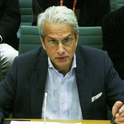The BBC enjoys a privileged position in our cultural life. It is paid for by a compulsory flat-rate tax on all television users. It enjoys a near monopoly over public service broadcasting. And yet it escapes rigorous scrutiny. Its governors and senior management are appointed without any of the open external oversight one might expect for individuals who spend billions of public money and dictate the shape of our cultural landscape.
It matters enormously what the BBC says, not only because its guaranteed public funding gives it a dominant position in British broadcast journalism, but also because the historic achievements of the World Service have won the organisation the trust of millions. And of all the issues which the BBC covers, few matter more than its approach to the politics of the middle east. The conflict which has blighted the lives of both Israelis and Palestinians is much more than a territorial struggle between two peoples: it is the front line of a broader ideological conflict between Islamism and the west. For any institution or individual covering this conflict, it is vital that a commitment to objectivity or balance does not descend into a posture of moral equivalence in which democrats who practice self-defence are placed on the same plane, or even judged more harshly, than combatants who set out to kill indiscriminately in the service of a totalitarian ideology.
The BBC seemed to appreciate the need to take particular care in reporting on the middle east when it recently appointed its own panel to examine recent coverage of the conflict. In the aftermath of the Gilligan affair, there was a growing sense of disquiet that our principal broadcaster was too willing to put the west in the dock, and unduly inclined to favour a casual, leftish, anti-American, anti-Israeli agenda.
But the report which was eventually published, drawn up by Quentin Thomas, the civil servant who masterminded the Northern Ireland peace process, draws four remarkable conclusions. First, it states that "apart from individual lapses, sometime of tone, language or attitude, there was little to suggest systematic or deliberate bias; on the contrary there was evidence… of a commitment to be fair, accurate and impartial." Second, it maintains that, "one side is wholly under the occupation of the other and, however reluctantly, necessarily endures the indignities of dependence." Third, the report asserts, "that Israeli fatalities generally receive greater coverage than Palestinian fatalities," thereby proving a "disparity in favour" of Israel at the BBC. And lastly, Thomas believes that the Israeli-Palestinian conflict can be distilled into "two rival narratives."
Any truly objective assessment of the BBC could never conclude that its coverage of the middle east conflict is "fair, accurate and impartial," let alone that it is biased in favour of Israel. Take, for example, the BBC's coverage of the late Yasser Arafat. In one profile broadcast in 2002, he was lauded as an "icon" and a "hero," but no mention was made of his terror squads, corruption, or his brutal suppression of dissident Palestinians. Similarly, when Israel assassinated the spiritual leader of Hamas, Sheikh Ahmed Yassin, in 2004, one BBC reporter described him as "polite, charming and witty, a deeply religious man." This despite the fact that under Yassin's guidance, Hamas murdered hundreds. And what of Orla Guerin's editorialising? On one occasion, she accused Israel of cynically manipulating "a Palestinian youngster for propaganda purposes." The "youngster" was a child suicide bomber.
OPT CUT ONE BEGINS If the Thomas Report were genuinely independent and objective, it would directly challenge the BBC's moral equivalence. But instead, it tries to justify it by saying that Israel and Palestine "are not on equal terms," and that this "asymmetry is most strikingly manifested in the fact of occupation." "Balance," it continues, is best achieved "where the parties to a dispute are on equal footing."
In other words, the BBC can be forgiven for showing bias in favour of the Palestinians, even when they murder innocent civilians, because they can't match Israel's "defence and intelligence capability." They are, according to Thomas, "frequently in the position of challenger," whereas "the Israelis are necessarily in the position of authority."
Indulging Palestinian terrorists who target innocent Israelis, on the basis that they are "challengers," is morally reprehensible. It is like saying that al Qaeda is justified in flying civilian planes into buildings because it doesn't have the defence capability of the US, or that the IRA was justified in blowing up Earl Mountbatten because it couldn't match the sophistication of British military intelligence. That sort of moral equivalence one expects from George Galloway or Noam Chomsky. It is not, however, what you would expect from an "independent panel."
Worse still is Thomas's claim that while "both sides suffer death and injury… in recent years the figures show it has fallen disproportionately on the Palestinians." He adds that the BBC gives greater coverage to Israeli deaths than Palestinian deaths. Contrary to what Thomas implies, that is not because the BBC is partial towards Israel. Rather, it is because the savage tactics of the Palestinian suicide squads are aimed directly at Israeli civilians. This means that even the BBC can't choose to ignore them. But unlike Hamas, the Israeli Defence Forces do not target innocent civilians. The majority of Arabs killed are either those murdered by fellow Arabs in internecine disputes, armed militia who have initially fired on the IDF or attacked Israel, or terror ringleaders targeted individually by the IDF. At no point in the conflict has Israel indiscriminately murdered Palestinian civilians. But since 1987, the Palestinians have slaughtered 1,500 Israelis in terror operations.
That is why Thomas's "independent" panel is wrong to present the conflict in terms of "two rival narratives." The phrase "rival narratives" implies that there is no objective standard with which to judge the respective experiences of Israelis and Palestinians. So, once again, we are in the realm of moral equivalence when moral clarity is demanded. But if Thomas and the BBC sought such clarity, they would readily admit that, since its creation, Israel wanted peace with its Arab neighbours. The totalitarian regimes that surround it, however, quest longingly for Israel's extinction. Except for Jordan and Egypt, the rest of the Arab world still refuses to acknowledge Israel's UN-mandated legitimacy. It is that basic struggle for survival, in the face of virulent and violent antisemitism, that forced Israel to adopt the defensive measures it has throughout its history.
The Irish commentator Eoghan Harris once wrote that a "culture of political bias cannot be countered by counting minutes of airtime. It is not susceptible to internal change because it is the ambient air that broadcasters breathe." The reason the Thomas Report fails is because it draws its conclusions by "counting minutes of airtime." And so it finds bizarrely, that because Israel received more "talk time" between August 2005 and January 2006, there is a general "disparity in favour of Israelis" at the BBC. The reason we hear more from Israelis, including critics of the government, than from Palestinians, is because Israel's democracy makes it easier for all voices, including dissident voices, to be heard, while the PA, even before the Hamas election victory, was a territory in which free media inquiry has been, to put it politely, hampered by the Palestinian leadership.
The only way this bias that affects the BBC can be tackled is through genuine openness rather than inquiries run by people who share the same perspective. That means an honest public acknowledgement of what so many in the BBC will freely, privately, confess. A soft left worldview influences too much of what the corporation produces. We have a right to expect more honesty from the broadcasting service we are being asked to pay for. It is about time we got it.











